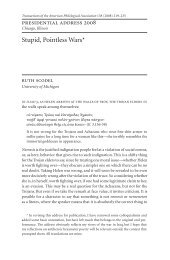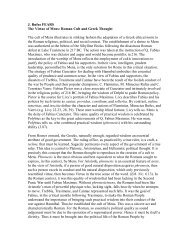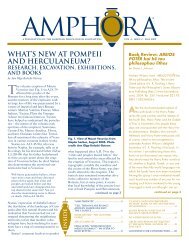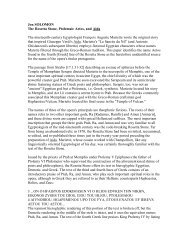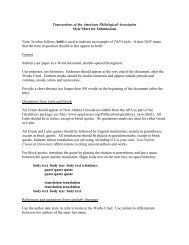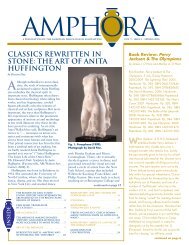Augustan Literature and Religion at Rome
Augustan Literature and Religion at Rome
Augustan Literature and Religion at Rome
Create successful ePaper yourself
Turn your PDF publications into a flip-book with our unique Google optimized e-Paper software.
Schultz 8<br />
of the discussion comprises Augustine’s rebuttal. 12 There is, however, one passage in which he<br />
quotes Varro directly on this point:<br />
Denique cum memor<strong>at</strong>us auctor civilem theologian a fabulosa et n<strong>at</strong>urali tertiam<br />
qu<strong>and</strong>am sui generis distinguere conaretur, magis eam ex utraque temper<strong>at</strong>am<br />
quam ab utraque separ<strong>at</strong>am intellegi voluit. Ait enim ea, quae scribunt poetae,<br />
minus esse quam ut populi sequi debeant; quae autem philosophi, plus quam ut ea<br />
vulgum scrutari expedi<strong>at</strong>. “Quae his abhorrent, inquit, ut tamen ex utroque<br />
genere ad civiles r<strong>at</strong>iones adsumpta sint non pauca. Quare quae erunt communia<br />
cum propriis, una cum civilibus scribemus; e quibus maior societas debet esse<br />
nobis cum philosophis quam cum poetis.” (Civ. D. 6.6)<br />
Finally, although our aforementioned author strives to distinguish the civil<br />
theology from the poetic <strong>and</strong> philosophical as a third type unto itself, he wishes it<br />
to be understood th<strong>at</strong> it is more mixed with each of the other two than it is distinct<br />
from them. For he says th<strong>at</strong> wh<strong>at</strong> the poets write is baser than wh<strong>at</strong> the people<br />
ought to follow, <strong>and</strong> wh<strong>at</strong> the philosophers write is more than wh<strong>at</strong> it is beneficial<br />
for the crowd to investig<strong>at</strong>e. He says, “There are elements in civil theology th<strong>at</strong><br />
are inconsistent with those two, yet more than a few aspects of each of them are<br />
taken up by it. Thus I will write about wh<strong>at</strong> the civil theology shares with them,<br />
<strong>and</strong> wh<strong>at</strong> is exclusive to itself. From this it will be clear th<strong>at</strong> we ought to maintain<br />
a closer connection with the philosophers than with the poets.”<br />
Unfortun<strong>at</strong>ely, we do not know where Varro saw the influence of liter<strong>at</strong>ure on the st<strong>at</strong>e religion.<br />
We know th<strong>at</strong> Augustine saw it in the<strong>at</strong>rical productions: following on the passage just quoted,<br />
he delivers a lengthy di<strong>at</strong>ribe against the shameful present<strong>at</strong>ion of the traditional gods on the<br />
stage. Is Augustine right? Did the Romans regularly present the gods on stage? And if they did,<br />
was it religion?<br />
It is underst<strong>and</strong>able if you answer those questions in the neg<strong>at</strong>ive. In contrast to Greek<br />
religion, where the centrality of cultic drama is widely acknowledged, its role in Roman religion<br />
is little understood <strong>and</strong> discussed even less. A survey of the indices of many of the h<strong>and</strong>books of<br />
Roman religion th<strong>at</strong> have appeared in the last 15 years reveals th<strong>at</strong> the topic is usually<br />
12 Wiseman 1998, 17-24, is more certain th<strong>at</strong> Augustine’s rebuttal follows Varro closely than I<br />
think Augustine’s text allows. Wiseman offers an excellent tre<strong>at</strong>ment of the little literary<br />
evidence available on the topic of cultic drama <strong>at</strong> <strong>Rome</strong>.


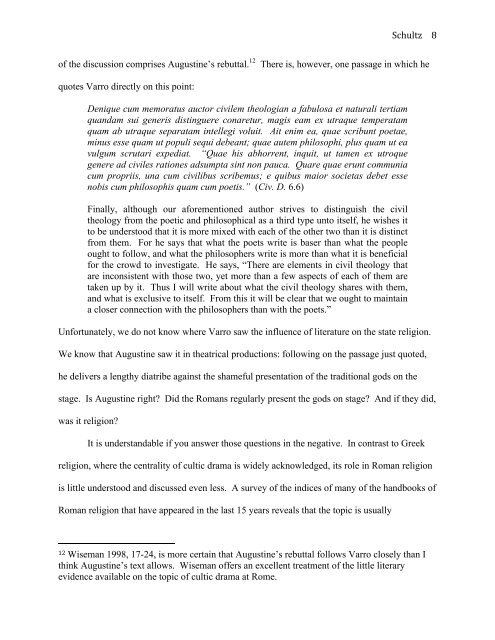
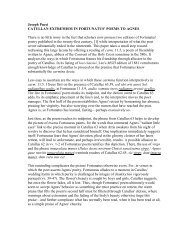
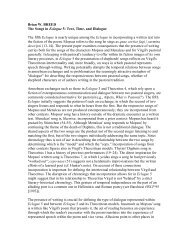
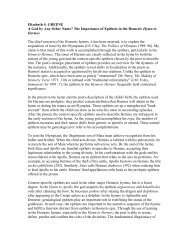
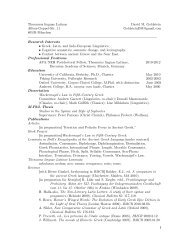
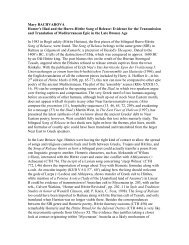
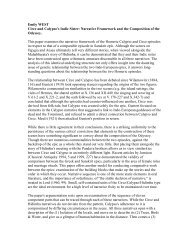
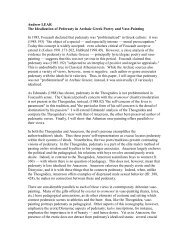
![John H. STARKS, Jr. [vo]cales vultus:Pantomime Actresses in Latin ...](https://img.yumpu.com/11930335/1/190x245/john-h-starks-jr-vocales-vultuspantomime-actresses-in-latin-.jpg?quality=85)
